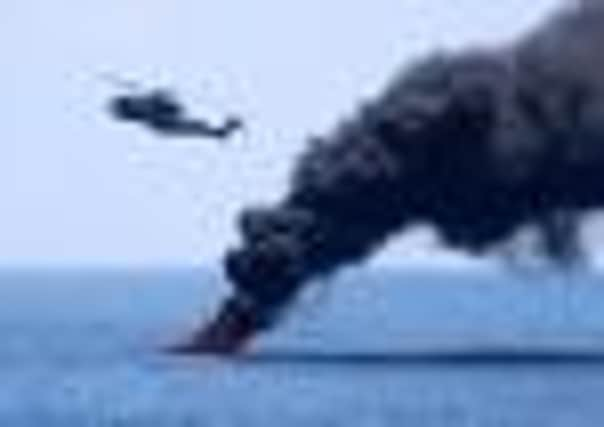EU forces fire on suspected pirate base on mainland Somalia


Five attack boats were holed and their outboard engines wrecked during the dawn mission, which an EU military official said was intended to “make life difficult” for the pirates on land as well as at sea.
It is the first time European military units have been ordered to attack pirates on mainland Somalia, and follows an EU ruling two months ago allowing “disruptive action against known pirate supplies on the shore”.
Advertisement
Hide AdAdvertisement
Hide Ad“An unidentified helicopter destroyed five of our hunting boats early in the morning. There were no casualties,” said one pirate, who identified himself only as Abdi. “We were setting off from shore when the helicopter attacked. We ran away without counter-attacking.”
The strike involved military personnel from several European navies patrolling off Somalia, including France, Germany, Italy, Spain, the Netherlands and Portugal.
The EU force, called Atalanta, was recently joined by the French amphibious assault ship Dixmude. The 21,300-tonne ship, the largest to serve with the EU mission, is capable of acting as a mobile operating base for 16 helicopters – including Tigre gunships – significantly adding to the reach of the naval force.
Alongside the five fibreglass skiffs, drums of diesel and a weapons store were hit, according to other pirate eyewitnesses. The EU would not confirm this, saying only that “equipment” was targeted.
There were no reports of casualties in the attack on Handulle village, about ten miles north of Haradheere town, in Mudug province, a key pirate lair. “We believe this action will further increase the pressure on [pirates], and disrupt pirates’ efforts to get out to sea to attack merchant shipping and dhows,” said Rear Admiral Duncan Potts, the British operation commander of the EU Naval Force.
“Our action against pirate supplies on the shoreline is merely an extension of the disruption carried out against pirate ships at sea, and Operation Atalanta remains committed to fighting piracy off the Horn of Africa and to the humanitarian mission of protecting World Food Programme ships that bring vital aid to the Somali people.”
The EU is the main donor to the Somali transitional government. It also trains Somali troops, and is reinforcing the navies of five neighbouring countries to enable them to counter piracy themselves. Since December 2008, the EU has kept five to ten warships off the Horn of Africa.
Nato (the North Atlantic Treaty Organisation) has a similar anti-piracy flotilla known as Ocean Shield, and other countries – including the United States, India, China, Russia, and Malaysia – also have dispatched naval vessels to patrol the region.
Advertisement
Hide AdAdvertisement
Hide AdOperations such at yesterday’s place at risk more than 300 hostages of various nationalies held by the pirates, who have so far generally refrained from killing crew as they seek multi-million dollar ransoms. “If we are attacked while with hostages, we shall take any necessary step to save ourselves, we may also kill the hostages if we miss other options to survive,” the pirate Abdi said.
A study published earlier this year by the One Earth Future Foundation showed Somali piracy cost the world economy some $7 billion (£4.4bn) last year, with ransoms paid reaching $160 million. The pirates are switching back to using smaller vessels as “motherships”, hoping to evade detection in the face of more robust maritime security.